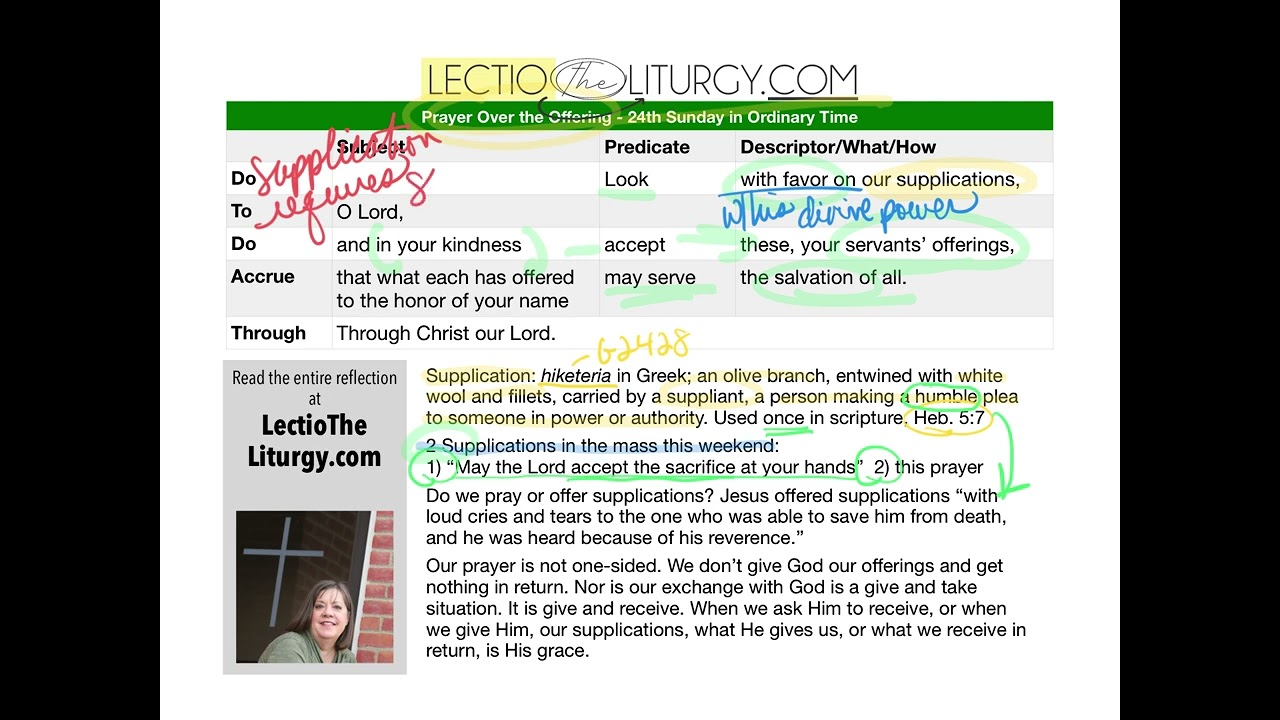Prayer Over the Offering 24th Sunday in Ordinary Time
Thanks for joining me, this week we Lectio the Liturgy with the Prayer Over the Offerings for the 24th Sunday in Ordinary Time.
Look with favor on our supplications, O Lord, and in your kindness accept these, your servants’ offerings, that what each has offered to the honor of your name may serve the salvation of all. Through Christ our Lord.
This prayer, asking God to look on our supplications, comes directly after another prayer of supplication in the mass, so let’s first take a look at the definition of supplication.
In Thayer’s Dictionary (G2428), we find the word supplication in Greek as hiketeria. It is defined as an olive branch, entwined with white wool and fillets, carried by a suppliant, a person making a humble plea to someone in power or authority. It is deeper than a prayer, it is a begging for something earnestly and humbly.
Hiketeria is used once in scripture, in Hebrews 5:7: “In the days when he [Jesus] was in the flesh, he offered prayers and supplications with loud cries and tears to the one who was able to save him from death, and he was heard because of his reverence.”
The supplications of Jesus were accompanied with loud cries and tears. Jesus laid it all out, He gave His all to the one who was able to save him from death, and he was heard.
In the mass this weekend, the first supplication in this succession of two, is a dialogue between the priest and the people, “Pray, brethren (or brothers and sisters), that my sacrifice and yours may be acceptable to God, the almighty Father.”
The people respond, “May the Lord accept the sacrifice at your hands for the praise and glory of His name, for our good and the good of all his holy Church.” This supplication is for the Church. This is where I began to wonder, has this phrase become just a response or do I pray it as a supplication? This supplication begs God to accept this sacrifice, the bread, the wine, and our own selves as the Church, and that he may find it acceptable.
Immediately following this exchange, we find the Prayer Over the Offerings, where we ask God to look with favor on our own supplications.
In the Latin form of the prayer, we find the word propitiare, to look with favor. Asking God to look with favor means that we ask him to perceive with His divine power, not just our words, but those supplications of our heart, the ones we may be afraid to ask Him for, or perhaps for the supplications that we may not even be aware of.
At this point of my reflection, I became aware of the times I’ve asked God to hear my prayer, but I haven’t pleaded. I have not made my prayer a supplication. What’s the difference between the two? Offering supplications requires us to surrender. How do I know? It’s about the reference to the olive branch. In ancient times, an olive branch was the symbol of the petitioner, extending an olive branch asking for peace.
Let’s take another look of the passage from Hebrews because there is an exchange that happens with supplications. Through His supplications, Jesus was able to surrender and trust in the Father’s will, and in that surrender, He found the peace He needed to endure the cross for the salvation of all.
Our prayer is not one-sided. We don’t give God our offerings and get nothing in return. Nor is our exchange with God is a give and take situation. It is give and receive. When we ask Him to receive, or when we give Him, our supplications, what He gives us, or what we receive in return, is His grace. In the Latin form of the prayer, for the verb serve, we find the word proficiat. It does mean to serve, however, it also means to contribute, advance, make progress, have success, and accomplish.
During the Prayer Over the Offering, when we give our supplications to God, what we receive in return is much, much greater. What we receive also isn’t just ours to keep, it is ours to share and use to accomplish His Salvation for all.
Thanks for praying with me,
Julie
